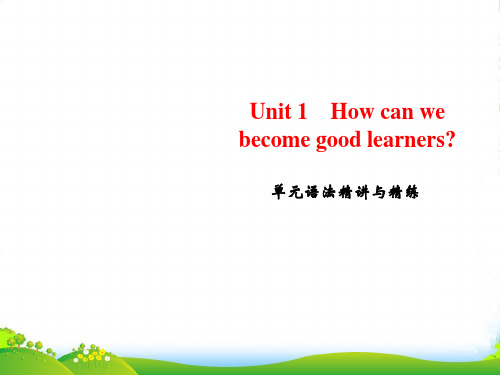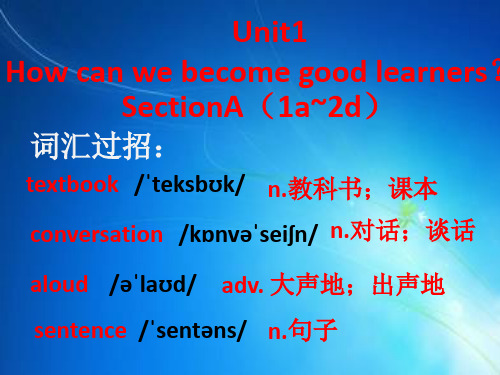人教版九年级Unit 1复习课件
合集下载
人教版九年级英语Unit 1-Unit 2【复习课件】-2023年中考英语一轮大单元复习(人教版)

with something interesting.
7.好的学习者会一直不断练习他们所学的东西,而且他们不害怕犯错。
Good learners will keep practicing
what they have learned,and
they are not afraid
of
making
mistakes .
上一页 返回导航 下一页
7.treat [详见 P127] v.对待;医治;治疗;招待;请(客) n.招待;款待
n.现在;礼物
adj.在场的;现在的 v.赠送;给予;呈现
上一页 返回导航 下一页
例:At present,we have no explanation for this.目前,我们还无法解释 这件事。(n.)
There were 300 people present at the meeting.有三百人出席会议。(adj.) She was presented with an award.她被授予一个奖项。(v.)
10.我想知道它是否和云南省傣族的泼水节相似。
I wonder
if it's similar
to the Water Festival of the
Dai people in Yunnan Province.
上一页 返回导航 下一页
11.因为新年是一个用来清扫和洗去不好的东西的时间。
Because the new year is a away bad things.
time
for cleaning and washing
12.嫦娥拒绝把仙药给他,并且喝光了它。
Chang'e refused to give it to him and took
人教版九年级unit1全单元课件(94张PPT)

现在完成时强调这一动作与现
在的关系,如对现在产生的结
果、影响等,而一般过去时只
表示过去的事实,不表示和现
在的关系。如:
I have just been to London. I went there last month. 我刚去过伦敦,是上个月去的。 I have been to the science museum many times. I went there on our last summer vocation. 我已经去了科学博物馆很多次。 上个暑假我还去了呢。
How do you study English?
I study English by taking part in English Contest
How do you study English?
I study English by watching English movies
“by + 动名词”常常表示手段、 方式或方法,可以用来回答how引 导的特殊疑问句。
have (has) been to 后面可接次数, 表示去过某地几次。 I’ve been to Beijing three times. 我去过北京三次。 They have been to that village several times. 他们去过那个村庄好几次了。
2. have (has) gone to 意为“到某 地去了”,表示到了某地或正在 去某地的途中。总之,说话时该 人不在现场,一般不用第一、第 二人称代词作句子的主语。如: - Where is Tom? 汤姆在哪里? - He has gone to the bookshop.
2. But I was afraid to ask questions because my pronunciation was very bad.
人教版九年级上册英语课件:Unit 1 Section A(3a-4c) (共22张PPT)

• 5.【辨析】as well、also、too与either。四者都可意为“也,还”, 但用法有区别。(1)as well是副词短语,常用于口语中。它相当于too, 通常位于肯定句句末,多与and和but搭配使用。(2)also通常位于be 动词、助动词和情态动词之后,实义动词之前。(3)too比also更口语 化,常用于肯定句中,既可放在句中,也可放在句末。常用逗号与句 子其他成分隔开。(4)either用于否定句句末。
• _____W__h_a_t/_H_o_w__ ______a_b_o_ut__going fishing this weekend?
• 5.My brother is only five years old,but he can play the piano very Awlethlol.ugh/Though
• 4.Taking no_t_e_s_____ is a good way to learn English.
• 5.His favourite subject isph_y_s_i_cs_________(物理) and he is very
good at it.
grammar
• 6.I find it hard to learn English _____________(语法).
• ③use是动词,意为“使用”,在句中作谓语。
基础训练
• 一、根据句意及首字母或中文提示写出单词。
• 1.He revealed (泄露) thes_ec_r_e_t________ (秘密) by accident.
• 2.He _____d_is_c_o_v_e_re_d____ (发现) a beautiful island. • 3.【山东烟台中考】John is interested cihnem__is_tr_y___________(化学).
Unit 1 课件(共35张PPT) 人教版九年级全册

1) It is no use/ good / useless + doing... 2) It is a waste of time + doing ... 3) It is fun + doing ... 在以上结构中常用动名词作主语。 It’s no use crying over spilt milk. 覆水难收。 It is fun playing with children. 和孩子们一起玩真好。
New words
Unit 1 Section A (Grammar Focus-4c)
repeat /rɪˈpiːt/
v.重复;重做
note /nəʊt/
n. 笔记;记录 v.注意;指出
pal /pæl/ n.朋友;伙伴 physics /ˈfɪzɪks/ n. 物理;物理学
chemistry /ˈkemɪstri/
A. playing B. to play C. play
Textbook
Unit 1 Section A (Grammar Focus-4c)
4a Match the questions and answers.
1. How do you practice speaking?
a. By watching English programs.
A. tell B. to tell C. telling
Grammar Focus
Unit 1 Section A (Grammar Focus-4c)
2. 用作宾语 1)作动词的宾语 常见的此类动词有:practise, understand, worry about, finish, give up, keep, keep on, look forward to, mind, miss, enjoy, depend on, cannot help, suggest, pay attention to, think about, succeed in, be used to, get used to, put off,等。
2021-2022学年人教版九年级上册英语Unit 1--unit2复习课件

Mid-Autumn Festival 中秋节 The Dragon Boat Festival 端午节
The Water Festival 泼水节 Christmas Day 圣诞节
April Fool’s Day 愚人节
Thanksgiving Day 感恩节
Easter 复活节
Mother's Day 母亲节
英语学习方法种草大会
Listening
By listening to tapes as often as possible, such as VOA, BBC News.
Moreover, listening to English songs is also helpful.
Speaking
By reading aloud to practice. By imitating what the native speakers say through the U.S TV series, talk shows, movies and so on. But the most useful way is to speak to the native speaker directly.
• 2. +时间 “到…为止” by the time of 2015
• 3. “在…附近;在…旁边” WZ is sitting by ZZJ.
I saw Kunkun playing basketball by the river.
• 4. +doing “通过”
JY learns English by watching reality shows.
5. connect v.连接,联系
人教版九年级英语上册课件:Unit 1 单元语法精讲与精练(共13张PPT)

二、根据汉语意思完成句子。
1.我妈妈经常骑自行车去上班,我总是乘地铁上学。 My mother often goes to work _b__y__ __b_i_k_e__. I always go to school __b_y__ ___su__b_w_a_y__. 2.—你怎样备考?—我通过小组合作学习。 —__H__o_w__ do you study for a test? —I study __b_y__ _w__o_r_k_in_g__ with a group.
2.动名词在句中作宾语 动名词在句中作宾语时,一般放在某一及物动词或介词之后充当这一动词或 介词的宾语。 (1)后接动名词作宾语的及物动词有: finish,enjoy,keep,stand(忍受),suggest,advise,practice,mind,imagine 等。如: The tourists enjoy staying in Kunming all the year round.游客们喜欢一整年都 待在昆明。 Do you mind opening the window? 你介意打开窗户吗?
我们,还在路上……
now. A.speak
B.to speak
C.spoken
D.speaking
the old that he gave up his loudly when I passed by just
( D )3.(广州中考)Sarah,you'd better drink moБайду номын сангаасe water after
些善于独立思考的人,给那些具有锲而不舍的人。2022年4月上午2时49分22.4.1902:49April 19, 2022 • 3、书籍—通过心灵观察世界的窗口.住宅里没有书,犹如房间里没有窗户。2022年4月19日星期二2时49分10秒02:49:1019 April 2022
人教版九年级全一册unit 1 1a~2d课件

( B )3. _____my watch,it’s 9:00am now.
A.According B.by C.below
猜测单词by 的含义: I know the wordby looking up thedictionary.
1
2
通过1和2,可猜测by的含义: by:介词.通过…的方式.
知识巩固: 翻译下面的句子:
4.Sound听起来….. 后接形容词。和本词用法一致的还有:look、 feel、taste……. ( A )1. The red coat____beautiful.
A.looks B.feel C.sound
( B )2. Your idea_____good. A.look B.sounds C.sound
Unit1 How can we become good learners?
SectionA(1a~2d)
词汇过招:
textbook /ˈteksbʊk/ n.教科书;课本 conversation /kɒnvəˈseiʃn/ n.对话;谈话
aloud /əˈlaʊd/ adv. 大声地;出声地
sentence /ˈsentəns/ n.句子
11、越是没有本领的就越加自命不凡 。21.8.3 20:20:2 120:20 Aug-21 3-Aug-2 1 12、越是无能的人,越喜欢挑剔别人 的错儿 。20:20: 2120:2 0:2120: 20Tues day, August 03, 2021 13、知人者智,自知者明。胜人者有 力,自 胜者强 。21.8.3 21.8.32 0:20:21 20:20:2 1Augus t 3, 2021 14、意志坚强的人能把世界放在手中 像泥块 一样任 意揉捏 。2021 年8月3 日星期 二下午8 时20分 21秒20 :20:212 1.8.3 15、最具挑战性的挑战莫过于提升自 我。。2 021年8 月下午 8时20 分21.8.3 20:20A ugust 3, 2021 16、业余生活要有意义,不要越轨。2 021年8 月3日 星期二8 时20分 21秒20 :20:213 August 2021 17、一个人即使已登上顶峰,也仍要 自强不 息。下 午8时20 分21秒 下午8 时20分2 0:20:21 21.8.3
A.According B.by C.below
猜测单词by 的含义: I know the wordby looking up thedictionary.
1
2
通过1和2,可猜测by的含义: by:介词.通过…的方式.
知识巩固: 翻译下面的句子:
4.Sound听起来….. 后接形容词。和本词用法一致的还有:look、 feel、taste……. ( A )1. The red coat____beautiful.
A.looks B.feel C.sound
( B )2. Your idea_____good. A.look B.sounds C.sound
Unit1 How can we become good learners?
SectionA(1a~2d)
词汇过招:
textbook /ˈteksbʊk/ n.教科书;课本 conversation /kɒnvəˈseiʃn/ n.对话;谈话
aloud /əˈlaʊd/ adv. 大声地;出声地
sentence /ˈsentəns/ n.句子
11、越是没有本领的就越加自命不凡 。21.8.3 20:20:2 120:20 Aug-21 3-Aug-2 1 12、越是无能的人,越喜欢挑剔别人 的错儿 。20:20: 2120:2 0:2120: 20Tues day, August 03, 2021 13、知人者智,自知者明。胜人者有 力,自 胜者强 。21.8.3 21.8.32 0:20:21 20:20:2 1Augus t 3, 2021 14、意志坚强的人能把世界放在手中 像泥块 一样任 意揉捏 。2021 年8月3 日星期 二下午8 时20分 21秒20 :20:212 1.8.3 15、最具挑战性的挑战莫过于提升自 我。。2 021年8 月下午 8时20 分21.8.3 20:20A ugust 3, 2021 16、业余生活要有意义,不要越轨。2 021年8 月3日 星期二8 时20分 21秒20 :20:213 August 2021 17、一个人即使已登上顶峰,也仍要 自强不 息。下 午8时20 分21秒 下午8 时20分2 0:20:21 21.8.3
Unit1辅导课件2021-2022学年人教版九年级英语全册

“Practice makes perfect.” Good learners will keep practicing what they have learned, and they are not afraid of making mistakes. Alexander Graham Bell did not invent the telephone overnight. He succeeded by trying many times and learning from his mistakes.
Developing their study skills It is not enough to just study hard. Good learners know the best way they can study. For example, they may take notes by writing down key words or by drawing mind maps.
Good learners often connect what they need to learn with something interesting. For example, if they need to learn English and they like music or sports, they can listen to English songs and watch sports programs in English. This way they will not get bored.
Asking questions Good learners often ask questions during or after class. They even ask each other and try to find out the answers. Knowledge comes from questioning.
- 1、下载文档前请自行甄别文档内容的完整性,平台不提供额外的编辑、内容补充、找答案等附加服务。
- 2、"仅部分预览"的文档,不可在线预览部分如存在完整性等问题,可反馈申请退款(可完整预览的文档不适用该条件!)。
- 3、如文档侵犯您的权益,请联系客服反馈,我们会尽快为您处理(人工客服工作时间:9:00-18:30)。
30.frustrate(v.)-frustrated (adj.)--frustrating (adj.)
31.quick(adj.)—quickly (adv.)
32.suggest(v.)—suggestion (n.)
33.help(v.)—helpful (adj.)
e(v.)—useful (adj.)
4.pronounce (v.)- pronunciation (不n 或可n.) 5. sentence: 可n make a sentence 造句
6. patient: 可n 病人 adj 有耐心的--- patience(不n)
7. express (v)表达---expression (可n)
3. I want to learn new words and more grammar so that I can have a better understanding of English movies. 为了对英语电影 有更好的了解,我想学新单词和更多的语法。 (so that引导的目的状语从句---in order to do 转换同义句)
35. slowly—quickly(反义词)—fast(同义词)
36. solution (n.)—solve (n.)
37. learn (v.)—learner (n.)
38. impress—impressed (adj.) 39. deal—dealt(过去式) 40. easy---easily (adv.) 41. lose—lost(过去式) 42. break– broke(过去式)—broken 43. important—unimportant(不重要的)
二.重点词组 Section A
1. 听录音
1. listen to tapes
2. 向sb要sth
2. ask sb for sth
3. 询问
3. ask sb about sth
4. 做抽认卡
4. make flashcards
5. 大声读
5. read aloud
6. 学到很多/一点
6. learn a lot/a little
12.在----的帮助下 12.with the help of = with one’s help
13.把-----比作---
pare… to…
14.代替
14.instead of
15.尽力做谋事
15.try one’s best to do
16.中断
16.break off
17.面对挑战
7.决定不做某事 7.decide not to do sth
8.彼此
8.each other
9.把----视为---- 9.regard …as…
…被看做、当作… be regarded as…
10.因为某事抱怨某人 plain to sb about
11.把-----变为----
11.change … into…
8. discover (v)– discovery (n) 发现原来存在但是没有发现的东西
9. secret: 可n keep the secret保守秘密 the secret to… ……的秘密
10. look up宾是代,放中间
ห้องสมุดไป่ตู้
11. grammar: 不n 12. note: 可n take notes做笔记 13. pal: 可n pen pal= pen friend笔友 14. physics: 不n– physical (adj)身体的,客观存在的 15. chemistry: 不n– chemical (adj)化学的 16. memorize (v) 记忆,记住– memory (n)记忆 17. pattern: 可n 18. speed (n)– speedy (adj)快的,迅速的,敏捷的 19. partner: 可n
4. Studies show that if you are interested in something, your
brain is more active and it is also easier for you to pay attention to it for a long time. 研究表明如果你对某事物感兴趣,你的大 脑就更活跃,也更容易长久地专注于此。 (It is +形容词+for sb to do sth.)
20. bear– born– born at birth出生时 be born with天生具有
21. ability: 可n 复数abilities – able (adj) 22. create (v) 创造– creative (adj)富有创造力的
23. brain: 可n 24. active (adj)– act(v) 表演– actor (n) 演员
17.face challenge
三.重点句子
1.The teacher spoke so quickly that I did not understand her most of the time.(so…that…引导的结果状语从句) 2. Although I could not understand everything the characters said, their body language and the expressions on their faces helped me to get the meaning. 虽然我不能领会影片中人物所说 的一切,但是他们的肢体语言和脸上的表情有助于我理解含义。 (although 引导的让步状语从句,不能和but连用)
三个词都与"大声"或"响亮"有关。 ①aloud是副词,重点在出声能让人听见,但声音不一定很大,常用在读书或
说话上。通常放在动词之后。aloud没有比较级形式。 如: He read the story aloud to his son. ②loud可作形容词或副词。用作副词时,常与speak, talk, laugh等动词连用, 多用于比较级,须放在动词之后。 如: She told us to speak a little louder. ③loudly是副词,与loud同义,有时两者可替换使用,但往往含有令人讨厌或 打扰别人的意思,可位于动词之前或之后。 如: He does not talk loudly or laugh loudly in public.
10. But whether or not you can do this well depends on your learning habits.但是,学得好与否取决于你的学习习惯。(whether引导主语 从句,谓语要用单数)
11. Good learners often connect what they need to learn with something interesting. 优秀的学习者经常会把他们需要学习的与有 兴趣的东西联系起来。(connect + what引导的宾语从句,what既引 导宾从,又作need的宾语) (宾语从句三注意:连词,时态加语序)
7. 做…的方式/方法 7. the way to do/the way of doing …
8. 看sb做了/经常做sth
8. watch sb do sth
9.玩的高兴 10.对…感到兴奋 11.以…结束 12. 根本不 13. 作一个调查
9. have fun doing 10. be excited about=be excited to do sth 11. end up doing sth 12. not at all 13. do a survey
Review of Unit 1 How can we become good learners?
一.词汇
1. textbook: 可n
2. conversation:可n make a conversation编个对话 3. aloud(adv)/loudly (adv)/ loud (adj,adv)
1.英语口语/书面语 1.spoken English/ written English
2.在…犯错误 2. make mistakes in…
3.以后,随后
3. later on
4.没关系
4. it doesn’t matter
5.害怕做某事 5. be afraid to do/ be afraid of doing
5. If they need to learn English and they like music or sports,
they can listen to English songs or watch sports programs in English. 如果他们需要学习英语,而且他们喜欢音乐或者运动, 他们就可以听英语歌曲,或者看英语的体育节目。 (if引导的条件状语从句,主情从现)
25. pay attention to doing sth注意做某事 to 是介词 26. connect…with… 把……和…….连起来
27. knowledge: 不n知识,学问 27. wisely (adv)明智的,聪明地) – wise (adj)聪明的 28. knowledge: 不n知识,学问 29.different(adj.)-differently(adv.)-difference(n.)
8. I discovered that listening to something interesting is the secret to language learning.我发现听感兴趣的东西是学习语言 的秘诀。(动名词短语listening to…作主语谓语要用单数is)
31.quick(adj.)—quickly (adv.)
32.suggest(v.)—suggestion (n.)
33.help(v.)—helpful (adj.)
e(v.)—useful (adj.)
4.pronounce (v.)- pronunciation (不n 或可n.) 5. sentence: 可n make a sentence 造句
6. patient: 可n 病人 adj 有耐心的--- patience(不n)
7. express (v)表达---expression (可n)
3. I want to learn new words and more grammar so that I can have a better understanding of English movies. 为了对英语电影 有更好的了解,我想学新单词和更多的语法。 (so that引导的目的状语从句---in order to do 转换同义句)
35. slowly—quickly(反义词)—fast(同义词)
36. solution (n.)—solve (n.)
37. learn (v.)—learner (n.)
38. impress—impressed (adj.) 39. deal—dealt(过去式) 40. easy---easily (adv.) 41. lose—lost(过去式) 42. break– broke(过去式)—broken 43. important—unimportant(不重要的)
二.重点词组 Section A
1. 听录音
1. listen to tapes
2. 向sb要sth
2. ask sb for sth
3. 询问
3. ask sb about sth
4. 做抽认卡
4. make flashcards
5. 大声读
5. read aloud
6. 学到很多/一点
6. learn a lot/a little
12.在----的帮助下 12.with the help of = with one’s help
13.把-----比作---
pare… to…
14.代替
14.instead of
15.尽力做谋事
15.try one’s best to do
16.中断
16.break off
17.面对挑战
7.决定不做某事 7.decide not to do sth
8.彼此
8.each other
9.把----视为---- 9.regard …as…
…被看做、当作… be regarded as…
10.因为某事抱怨某人 plain to sb about
11.把-----变为----
11.change … into…
8. discover (v)– discovery (n) 发现原来存在但是没有发现的东西
9. secret: 可n keep the secret保守秘密 the secret to… ……的秘密
10. look up宾是代,放中间
ห้องสมุดไป่ตู้
11. grammar: 不n 12. note: 可n take notes做笔记 13. pal: 可n pen pal= pen friend笔友 14. physics: 不n– physical (adj)身体的,客观存在的 15. chemistry: 不n– chemical (adj)化学的 16. memorize (v) 记忆,记住– memory (n)记忆 17. pattern: 可n 18. speed (n)– speedy (adj)快的,迅速的,敏捷的 19. partner: 可n
4. Studies show that if you are interested in something, your
brain is more active and it is also easier for you to pay attention to it for a long time. 研究表明如果你对某事物感兴趣,你的大 脑就更活跃,也更容易长久地专注于此。 (It is +形容词+for sb to do sth.)
20. bear– born– born at birth出生时 be born with天生具有
21. ability: 可n 复数abilities – able (adj) 22. create (v) 创造– creative (adj)富有创造力的
23. brain: 可n 24. active (adj)– act(v) 表演– actor (n) 演员
17.face challenge
三.重点句子
1.The teacher spoke so quickly that I did not understand her most of the time.(so…that…引导的结果状语从句) 2. Although I could not understand everything the characters said, their body language and the expressions on their faces helped me to get the meaning. 虽然我不能领会影片中人物所说 的一切,但是他们的肢体语言和脸上的表情有助于我理解含义。 (although 引导的让步状语从句,不能和but连用)
三个词都与"大声"或"响亮"有关。 ①aloud是副词,重点在出声能让人听见,但声音不一定很大,常用在读书或
说话上。通常放在动词之后。aloud没有比较级形式。 如: He read the story aloud to his son. ②loud可作形容词或副词。用作副词时,常与speak, talk, laugh等动词连用, 多用于比较级,须放在动词之后。 如: She told us to speak a little louder. ③loudly是副词,与loud同义,有时两者可替换使用,但往往含有令人讨厌或 打扰别人的意思,可位于动词之前或之后。 如: He does not talk loudly or laugh loudly in public.
10. But whether or not you can do this well depends on your learning habits.但是,学得好与否取决于你的学习习惯。(whether引导主语 从句,谓语要用单数)
11. Good learners often connect what they need to learn with something interesting. 优秀的学习者经常会把他们需要学习的与有 兴趣的东西联系起来。(connect + what引导的宾语从句,what既引 导宾从,又作need的宾语) (宾语从句三注意:连词,时态加语序)
7. 做…的方式/方法 7. the way to do/the way of doing …
8. 看sb做了/经常做sth
8. watch sb do sth
9.玩的高兴 10.对…感到兴奋 11.以…结束 12. 根本不 13. 作一个调查
9. have fun doing 10. be excited about=be excited to do sth 11. end up doing sth 12. not at all 13. do a survey
Review of Unit 1 How can we become good learners?
一.词汇
1. textbook: 可n
2. conversation:可n make a conversation编个对话 3. aloud(adv)/loudly (adv)/ loud (adj,adv)
1.英语口语/书面语 1.spoken English/ written English
2.在…犯错误 2. make mistakes in…
3.以后,随后
3. later on
4.没关系
4. it doesn’t matter
5.害怕做某事 5. be afraid to do/ be afraid of doing
5. If they need to learn English and they like music or sports,
they can listen to English songs or watch sports programs in English. 如果他们需要学习英语,而且他们喜欢音乐或者运动, 他们就可以听英语歌曲,或者看英语的体育节目。 (if引导的条件状语从句,主情从现)
25. pay attention to doing sth注意做某事 to 是介词 26. connect…with… 把……和…….连起来
27. knowledge: 不n知识,学问 27. wisely (adv)明智的,聪明地) – wise (adj)聪明的 28. knowledge: 不n知识,学问 29.different(adj.)-differently(adv.)-difference(n.)
8. I discovered that listening to something interesting is the secret to language learning.我发现听感兴趣的东西是学习语言 的秘诀。(动名词短语listening to…作主语谓语要用单数is)
